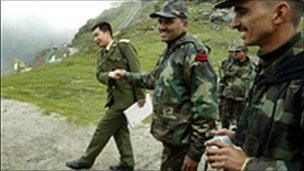India cancels China defence exchanges after visa row
- Published

China reopened the Nathu La pass to border trade; an agreement on defence ties was signed in 2006
India has cancelled defence exchanges with China after China refused a visa to a Kashmir-based general.
The Indian government said that China had to be sensitive to India's concerns, one of which is the disputed area of Kashmir.
As well as India and Pakistan, China also claims part of Kashmir.
Defence ties between China and India have remained tentative due to long-standing disputes and a lack of trust; the two fought a short war in 1962.
Indian Lt Gen BS Jaswal is responsible for Indian army operations in the Indian-administered state of Jammu and Kashmir.
He had hoped to travel to Beijing in August as part of a high-level exchange, but was denied a visa.
Old tensions
"While we value our exchanges with China, there must be sensitivity to each others' concerns. Our dialogue with China on these issues is ongoing," India's foreign ministry spokesman said in a statement.
The Times of India said the row had blocked the visit of Indian generals to China and another planned visit of Chinese generals to India.
The Indian foreign ministry noted that defence exchanges with China in recent years had proven "useful".
China and India fought a short border war in 1962. China is strongly critical of India for granting residence to the exiled Tibetan spiritual leader, the Dalai Lama.
It is also close to India's traditional foe, Pakistan, with whom it is cooperating on military and missile development, cross-border infrastructure, and a deep-water port.
Last year, India protested against the Chinese practice of issuing visas to Kashmiris on separate pieces of paper, unlike the standard visas it offered to other Indians.
The disputed status of Kashmir has been behind two of the three wars between India and Pakistan; the two countries each administer part of Kashmir but claim the territory in full.
China maintains that part of Kashmir should be in Tibet, which it claims.
A separatist insurgency in Kashmir has killed tens of thousands of people since it began in 1989.